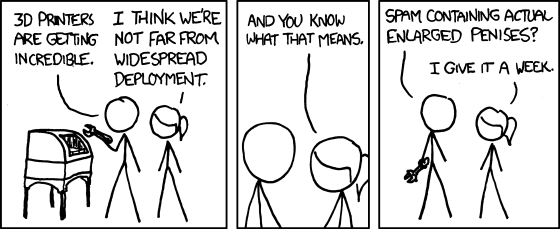3D Printer

I just can't wait for the Better Homes and Gardens list of helpful tips for household reuse of sixteen-inch acrylonitrile-butadiene-styrene phalluses.

I just can't wait for the Better Homes and Gardens list of helpful tips for household reuse of sixteen-inch acrylonitrile-butadiene-styrene phalluses.
With the ongoing development of 3D printing technology, the cost of low end 3D printers continues to reduce steadily, and the complexity of modelling and producing components is becoming easier. These factors, among others, means that 3D printers are beginning to be found in homes, rather than exclusively in businesses. Ponytail & Cueball are discussing the improvements and expect widespread deployment soon.
Spam emails promoting penis-enlargement products are very common, and often show images of unnaturally large penises to advertise how effective they are. The adverts prevalence and aggressive marketing techniques have made them a well known staple of email inboxes, though the improvement of spam filters has increasingly banished them to the spam folder.
Cueball and Ponytail predict that the spam producers will quickly jump on the opportunity presented by the widespread prevalence of 3D printers, and start advertising their wares with 3D printed phalluses. Usually someone would have to proactively choose to print out a spam email, but it wouldn't be difficult to imagine a scenario where the email contains malicious code which automatically prints them a huge phallus.
In the title text, Better Homes and Gardens is an American magazine that, as the name suggests, shows you how to make your home and garden better often by reusing common household items in new and innovative ways. Acrylonitrile-butadiene-styrene (or ABS) is a light-weight and moldable plastic which makes it perfect for 3D printers.